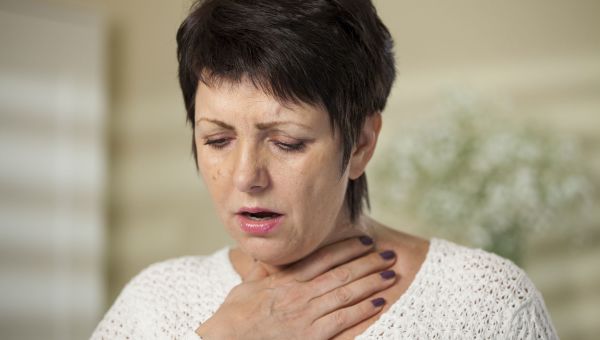When being out of breath is something serious
Struggling for air? It might be a sign of a larger health concern like low blood pressure or heart failure.

Have you ever been out of breath after hiking up a long flight of stairs or finishing a tough workout? You’re not alone. When you overexert yourself, it’s pretty normal to experience shortness of breath. However, there are times when struggling to catch your breath may signal a larger health issue.
The most common reasons for being out of breath? “An underlying lung issue,… Show More
Have you ever been out of breath after hiking up a long flight of stairs or finishing a tough workout? You’re not alone. When you overexert yourself, it’s pretty normal to experience shortness of breath. However, there are times when struggling to catch your breath may signal a larger health issue.
The most common reasons for being out of breath? “An underlying lung issue, like asthma or COPD, a cardiac issue and being a little out of shape are probably the main reasons,” says Nicholas Roy, DO, an expert in internal medicine, pulmonary medicine and critical care with Pulmonary and Sleep Associates of South Jersey in Cherry Hill, New Jersey. Here are the times when you should and shouldn’t worry about being out breath.
Show Less
Normal: In high altitudes
If your breathing is labored on your trip to Denver, Colorado, you probably don’t need to rush to the clinic. In fact, it’s common to experience shortness of breath when you visit a location with a higher altitude than you’re used to. As you reach higher heights, the air gets thinner, and less… Show More
If your breathing is labored on your trip to Denver, Colorado, you probably don’t need to rush to the clinic. In fact, it’s common to experience shortness of breath when you visit a location with a higher altitude than you’re used to. As you reach higher heights, the air gets thinner, and less oxygen is available. Your body compensates by taking in more breaths. Some simple ways to adjust to a higher altitude: stay hydrated, limit how much caffeine and alcohol you drink before your trip, and arrive well rested.
Show Less
Normal: When you’re pregnant
Expecting mothers might find it more difficult to breathe at times. As your body adjusts to new hormone levels and the added pressure from carrying a child, it’s common and normal for breathing to quicken.
When normal breathing begins to wane, whatever the cause, take a break. “The first… Show More
Expecting mothers might find it more difficult to breathe at times. As your body adjusts to new hormone levels and the added pressure from carrying a child, it’s common and normal for breathing to quicken.
When normal breathing begins to wane, whatever the cause, take a break. “The first thing you should do is sit down, take some slow deep breaths and try to see if your symptoms improve,” Roy says. “And if they don't get better and you're not exerting yourself, that's when you want to think about calling for medical assistance.”
Show Less
Normal: During a workout
It’s probably normal to be a little out of breath during an intense workout. Your cells need oxygen to function, and depending on the intensity of your activity, your body might require different amounts of oxygen to function. During less active periods like sitting or walking your muscles don’t… Show More
It’s probably normal to be a little out of breath during an intense workout. Your cells need oxygen to function, and depending on the intensity of your activity, your body might require different amounts of oxygen to function. During less active periods like sitting or walking your muscles don’t need as much oxygen as they do when you’re working out or running. To deliver the oxygen your body needs during active periods, your breathing increases. If your workout is causing you to be out of breath, you may want to take a break or decrease your intensity. A quick way to determine your intensity? The talk test. During moderate-intensity movement, you should be able to talk, but not sing, and during vigorous-intensity activity, saying more than a few words without pausing for breath will be difficult.
Show Less
Not Normal: When it could mean a heart attack
When there is no clear cause like exercise or a bun in the oven, and labored breathing is sudden and severe or accompanied by other symptoms, there may be an underlying health concern. And one possible culprit could be an impending heart attack.
Your heart needs oxygen-rich blood to survive, and if… Show More
When there is no clear cause like exercise or a bun in the oven, and labored breathing is sudden and severe or accompanied by other symptoms, there may be an underlying health concern. And one possible culprit could be an impending heart attack.
Your heart needs oxygen-rich blood to survive, and if the blood supply to part of the heart suddenly stops, then you can have a heart attack. Heart attacks are fairly common; affecting about 735,000 Americans each year. Heart attack risk factors include obesity, diabetes, smoking, high blood pressure and high cholesterol. So, how can you tell if your labored breathing is a heart attack sign?
It’s important to assess the symptoms that occur with shortness of breath. If you experience labored breathing along with chest pain, which may come and go for some and remain constant for others, or sudden clamminess, although this doesn’t happen to everyone, you may be having a heart attack, Roy says. If you’re having a heart attack, call 9-1-1 and wait for an ambulance. Some experts suggest, taking a full-strength aspirin (325 mg) during a heart attack may help reduce your chances of a blood clot.
Show Less
Not Normal: When it could mean heart failure
Heart failure, a condition in which your heart is unable to pump adequate blood throughout the body, can happen quickly or progress over time. Heart failure affects more than five million Americans—many of whom have diabetes, high blood pressure, heart disease or a combination of the three. Often… Show More
Heart failure, a condition in which your heart is unable to pump adequate blood throughout the body, can happen quickly or progress over time. Heart failure affects more than five million Americans—many of whom have diabetes, high blood pressure, heart disease or a combination of the three. Often times, heart failure occurs as a chronic, or long-term, condition with symptoms like an irregular heartbeat, coughing and shortness of breath and fatigue during activities, all of which may worsen slowly over time. Shortness of breath can also occur suddenly, in the case of acute heart failure.
“In the case of heart failure, shortness of breath will typically be accompanied by some swelling of the legs,” Roy says. “Breathing may also get worse when you lay flat, and better when you sit up.”
Other symptoms of both acute and chronic heart failure include fatigue, wheezing and decreased concentration. Symptoms are often misinterpreted, as many of them are both subtle and common among a myriad of conditions, so sharing any and all signs with your doctor is important.
Show Less
Not Normal: When it could mean low blood pressure
Most people may associate high blood pressure with poor health, but low blood pressure can also negatively influence your health.
When blood pressure levels get too low, called hypotension, it can cause dizziness and fainting. Abnormally low blood pressure most often affects pregnant women, people… Show More
Most people may associate high blood pressure with poor health, but low blood pressure can also negatively influence your health.
When blood pressure levels get too low, called hypotension, it can cause dizziness and fainting. Abnormally low blood pressure most often affects pregnant women, people with heart conditions, those on prolonged bed rest or people with nutrient deficiencies.
Mild hypotension symptoms include nausea, fatigue and dizziness. When hypotension is severe, in the case of extreme blood loss or anaphylaxis, it can cause shock, which is characterized by shortness of breath, clammy skin and confusion. If you’re experiencing these severe symptoms, seek immediate medical help. Severe hypotension can be caused by a heart attack, pulmonary embolism, arrhythmia or sepsis. It’s also important to note: one lower than normal blood pressure reading is probably not cause for concern, but if other symptoms, like dizziness and nausea are present, it’s always best to check with your healthcare provider.
Show Less
Not Normal: When it could mean pulmonary embolism
Shortness of breath may be normal or related to the health of your heart, but it could also signal a problem with your lung. A pulmonary embolism is a blood clot that often starts in the legs and finds its way into an artery in the lungs. Each year, pulmonary embolisms occur in more than 600,000… Show More
Shortness of breath may be normal or related to the health of your heart, but it could also signal a problem with your lung. A pulmonary embolism is a blood clot that often starts in the legs and finds its way into an artery in the lungs. Each year, pulmonary embolisms occur in more than 600,000 Americans—many of whom are bedridden or spend large periods of time sitting, are overweight, smoke, are pregnant, have heart disease or abnormal blood clotting.
Sudden shortness of breath is among the most common symptoms of pulmonary embolism, and it’s often accompanied by chest pain and coughing up blood. Pulmonary embolisms are treatable, but can be life threatening if undetected. If you think it could be a pulmonary embolism, then seek medical attention right away.
Even though there are times shortness of breath could be something more serious, don’t rush to any hasty decisions. It’s always best to speak with your doctor about any symptoms to get the right diagnosis and treatment, if necessary. Shortness of breath should be taken seriously, and is something you should discuss with your physician, Roy says.
Show Less
Not Normal: When it’s a sign of pneumonia
Pneumonia is an infection caused most commonly by fungi, bacteria and viruses in one or both of the lungs. One alarming symptom of pneumonia is shortness of breath during normal daily activities. Other signs of pneumonia include a cough with phlegm that may worsen over time, chest pain when… Show More
Pneumonia is an infection caused most commonly by fungi, bacteria and viruses in one or both of the lungs. One alarming symptom of pneumonia is shortness of breath during normal daily activities. Other signs of pneumonia include a cough with phlegm that may worsen over time, chest pain when breathing or coughing and a high fever.
Those at the highest risk of developing pneumonia are adults over 65 and children younger than two years of age. Smoking, immune disorders, chronic lung disease and certain brain disorders can also up your risk for pneumonia.
Pneumonia can be treated with fluids, antibiotics and oxygen therapy, and some types can even prevented with some vaccines. However, it’s still a serious condition—of the one million Americans hospitalized for pneumonia each year, some 50,000 die from the disease. If symptoms like cough, chest pain, shortness of breath or night sweats worsen, call your healthcare provider right away.
Show Less
Not Normal: When it could mean you have asthma
Asthma, a chronic condition that narrows airways and makes breathing difficult, affects about 25 million Americans. For some, asthma is a minor inconvenience, but for others, the condition could potentially lead to life-threatening asthma attacks. The causes or triggers of asthma differ, but are… Show More
Asthma, a chronic condition that narrows airways and makes breathing difficult, affects about 25 million Americans. For some, asthma is a minor inconvenience, but for others, the condition could potentially lead to life-threatening asthma attacks. The causes or triggers of asthma differ, but are often linked to allergies, air pollutants, stress, exercise or illness.
Most people with asthma experience symptoms like shortness of breath, accompanied by wheezing, chest tightness and coughing that’s often worse in the morning or at night. If wheezing and shortness of breath worsen rapidly, and your rescue inhaler doesn’t help, seek immediate medical attention. Asthma attacks can turn deadly so if you think you have the condition, talk to your doctor about getting tested. There is no cure for asthma, but treatment is available and may include oral medications, inhalers and actively working to avoid triggers.
Show Less
Not Normal: When You Could Have COPD
More than 15 million Americans have been diagnosed with chronic obstructive pulmonary disease (COPD), a progressive disease that makes it hard to breathe. COPD comes in several forms, with the two most common being chronic bronchitis and emphysema. The primary cause of COPD is long-term exposure to… Show More
More than 15 million Americans have been diagnosed with chronic obstructive pulmonary disease (COPD), a progressive disease that makes it hard to breathe. COPD comes in several forms, with the two most common being chronic bronchitis and emphysema. The primary cause of COPD is long-term exposure to a substance that irritates the lungs like cigarette smoke, air pollution or chemicals. Smokers and people who work with chemicals or pollutants have an increased COPD risk.
Diagnosing COPD can be tricky. In the early stages, people may experience no symptoms or mild symptoms. COPD symptoms include shortness of breath, coughing that produces mucus, wheezing and chest tightness. These symptoms usually worsen over time. When COPD is severe, your ankles, feet and legs may swell and you may experience unexplained weight loss.
Severe COPD flare-ups may need to be treated in a hospital, so seek medical attention if you experience any of the following: trouble talking or breathing, your lips or fingers turn blue or gray or your heart rate increases rapidly.
Show LessMore On


video

article

slideshow


video


video
